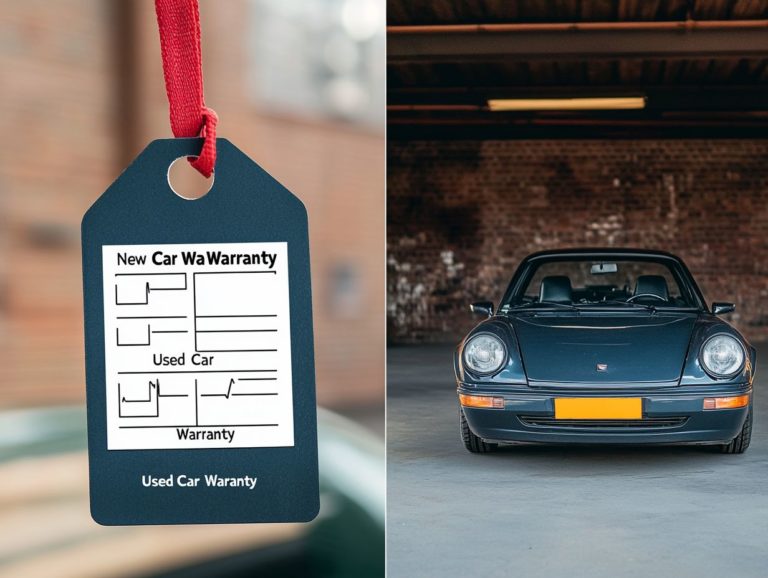5 Myths About Used Car Warranties
When it comes to purchasing a used car, navigating the landscape of warranties can feel overwhelming. A multitude of myths surrounds used car warranties, often leading buyers to base their decisions on misconceptions. Let s clear up these myths so you can make a smart purchase!
This article aims to debunk five prevalent myths that might have you second-guessing your choices. From the assumption that all used cars come with a warranty to the belief that only expensive vehicles are covered, we clarify the essential information you need before making your purchase.
You will also discover the various types of warranties, their benefits, and potential alternatives that may better suit your needs. Whether you’re a seasoned buyer or embarking on this journey for the first time, grasping these myths can save you both time and money in the long run.
Contents
- Key Takeaways:
- 1. Used Car Warranties Are Not Worth the Money
- 2. All Used Cars Come with a Warranty
- 3. Used Car Warranties Cover Everything
- 4. Used Car Warranties Are Only for Expensive Cars
- 5. Used Car Warranties Are Difficult to Understand
- What Is a Used Car Warranty and How Does It Work?
- Frequently Asked Questions
- What are the most common myths about used car warranties?
- Is it true that used car warranties are always a waste of money?
- Are used car warranties only necessary for older or unreliable cars?
- What is the difference between an extended warranty and a manufacturer warranty?
- Do used car warranties cover all types of repairs?
- Do I have to buy a warranty from the dealership where I purchased the car?
Key Takeaways:
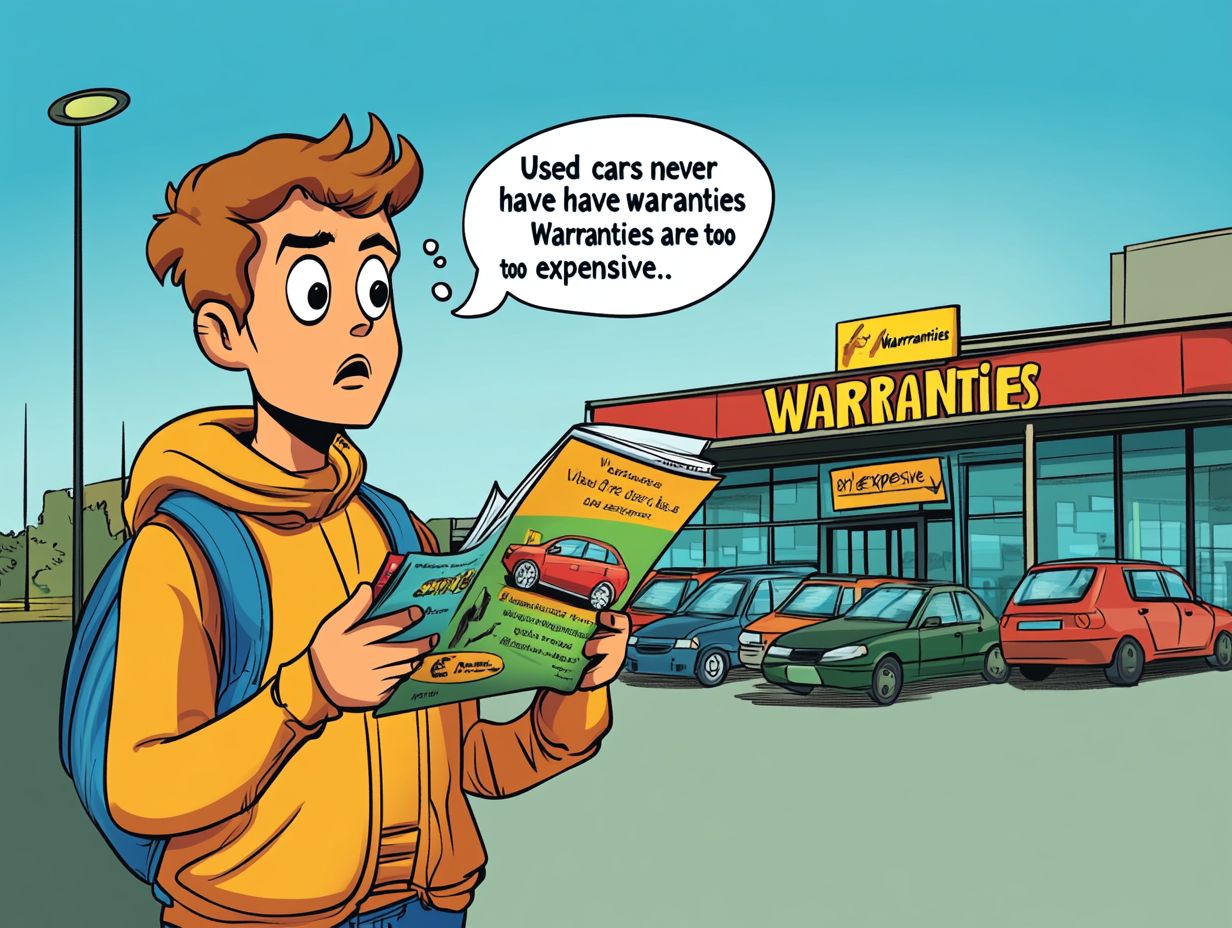
- Used car warranties can save you money in the long run by covering unexpected repairs.
- Not all used cars come with a warranty, so it’s important to do your research and consider purchasing one. Act now to take advantage of these savings!
- Used car warranties do not cover everything, so understanding the specific coverage before making a purchase is essential.
1. Used Car Warranties Are Not Worth the Money
Many car owners often find themselves questioning the true value of a used car warranty. You might wonder whether the costs tied to third-party warranties and full coverage truly justify the potential financial protection against those unexpected repairs that can pop up during ownership.
This skepticism frequently stems from common misconceptions about warranties. Many buyers assume that nearly all repairs are covered, only to discover later that certain exclusions can lead to surprising out-of-pocket expenses.
Recent statistics reveal that almost 30% of used car owners encounter repair costs averaging around $1,500 after their purchase, which can certainly make the initial warranty investment look more enticing.
A study indicated that while 60% of claims filed by warranty holders are honored, the associated deductibles and hidden fees often leave them with significant amounts still to pay.
For some, a warranty provides invaluable peace of mind, particularly for those investing in higher-mileage vehicles known for their unpredictability. However, it’s crucial to thoughtfully weigh these benefits against the potential financial burdens they may introduce.
2. All Used Cars Come with a Warranty
While it s common to think that all used cars come with a manufacturer warranty, the truth is more complex. Warranty status can vary significantly based on the vehicle’s age, mileage, and previous ownership.
Understanding the differences between manufacturer warranties and third-party warranties is crucial for you as a potential buyer. Manufacturer warranties, often attached to the vehicle from the get-go, typically cover defects and specific repairs for a limited time and mileage.
On the other hand, third-party warranties present varying levels of coverage that might not meet factory standards and can exclude certain parts or systems. The vehicle’s history is key to determining warranty status.
Previous accidents, maintenance records, and even modifications can influence your eligibility for coverage. Automotive retail practices, particularly how transparent the vehicle’s history is at the point of sale, significantly affect your awareness of these warranties.
If you’re considering a used vehicle purchase, it s wise to verify the warranty status. Check the manufacturer s website or reach out to their customer service, and review any documentation provided during the sale to ensure that the coverage aligns with your expectations and needs.
3. Used Car Warranties Cover Everything
A common misconception is that used car warranties cover everything. However, there are substantial exclusions and fine print that can limit your coverage options for car problems. To ensure you’re getting the best deal, consider exploring 5 ways to save money on car warranties.
Many buyers overlook that key components such as the transmission, electrical system, and even wear-and-tear items like brakes and tires may not be included in the warranty s terms. This lack of comprehensive coverage can lead to frustrating situations where your claim is denied simply because the issue falls under an exclusion.
For example, if you experience a transmission failure shortly after purchasing a used vehicle, you might be shocked to learn that the warranty doesn’t cover driver-induced failure. Understanding warranty details is essential before finalizing your purchase. Missing these crucial details could result in significant out-of-pocket expenses.
4. Used Car Warranties Are Only for Expensive Cars
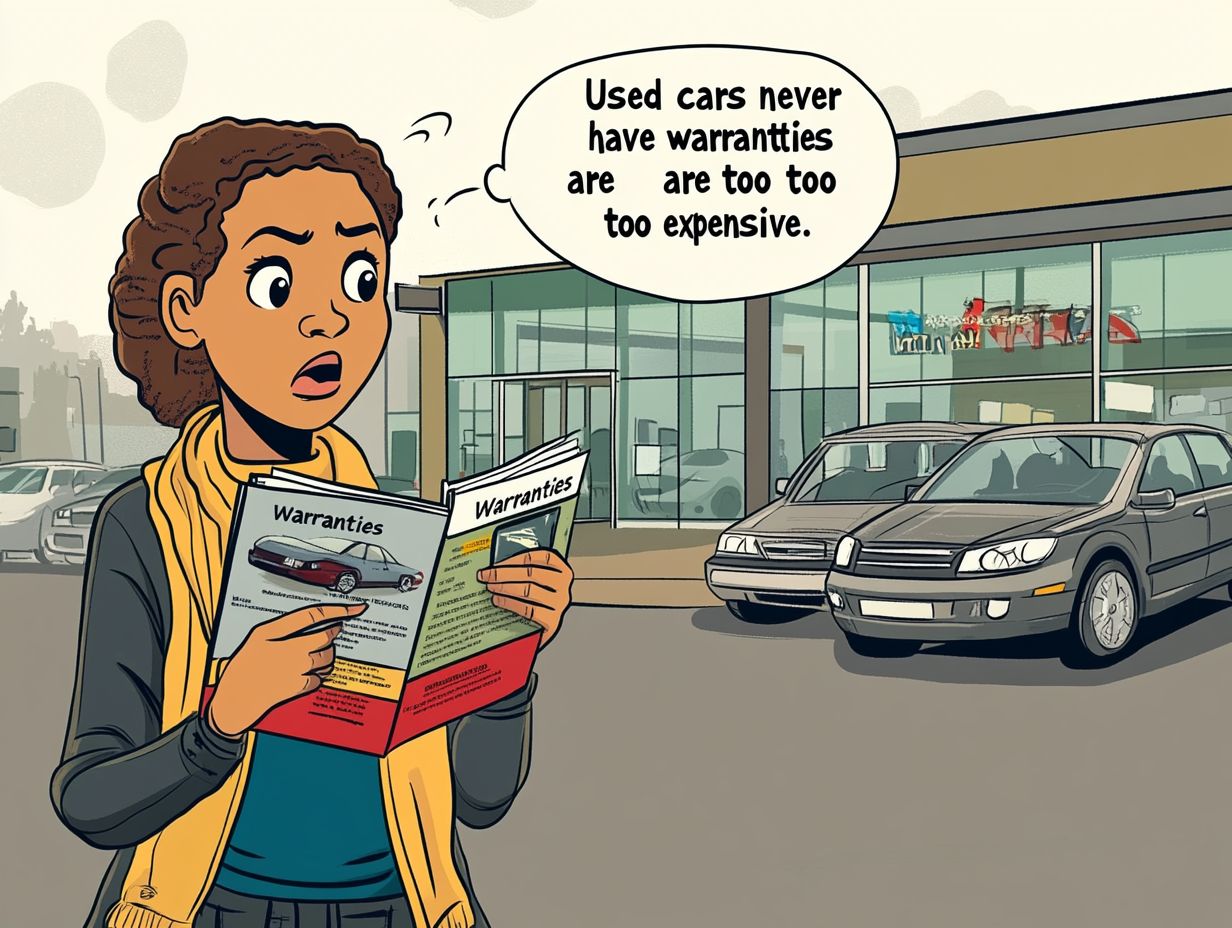
The idea that used car warranties are only valuable for high-end vehicles is misleading. Financial protection through a used car warranty is smart for any car owner, regardless of vehicle cost. Additionally, new car buyers should be aware of common misconceptions; check out the top 5 leasing myths busted to make informed decisions.
Warranties offer peace of mind for those investing in budget-friendly models, ensuring that unexpected repair costs won t leave you in a tough spot. A modestly priced car can still face major mechanical issues, which can be overwhelming without coverage.
Used car warranties can also boost resale value. When selling your vehicle, having a transferable warranty attracts potential buyers who appreciate the extra layer of security.
With various used car warranty options available, tailored to different financial circumstances, you can find protection that fits your budget.
5. Used Car Warranties Are Difficult to Understand
Many consumers find used car warranties complex, often confused by intricate terms and fine print that can complicate the warranty claims process.
Navigating these nuances can be daunting, especially for those not well-versed in automotive terminology or the various coverage options. Buyers must quickly understand commonly used jargon, like deductibles (the amount you pay before the warranty kicks in) and exclusions (what’s not covered), as these can influence their responsibilities and benefits under the warranty.
Keeping precise repair records is crucial; these documents serve as vital evidence when filing a claim. To simplify this journey, consumers should seek clarity from knowledgeable sources, ask questions about confusing terms, and maintain meticulous records of all service work.
This proactive approach ensures smoother transactions when claims arise.
What Is a Used Car Warranty and How Does It Work?
A used car warranty acts as your financial shield against unexpected repairs. Think of it as a specialized insurance policy that covers a range of mechanical failures during the warranty period.
These warranties typically feature important elements:
- Specified duration: Ranges from a few months to several years.
- Defined mileage limit: Specifies how far you can drive during the warranty period.
- Coverage of essential components: Typically includes the engine, transmission, and electrical systems.
By providing this peace of mind, a used car warranty allows you to drive confidently, free from the worry of looming repair costs. Unlike traditional auto insurance, which focuses on accidents and liability, a used car warranty is centered on mechanical issues that may arise after your purchase, offering a more customized approach to vehicle protection.
What Are the Different Types of Used Car Warranties?
When it comes to used car warranties, you have several excellent options: manufacturer warranties, third-party warranties, and extended car warranties. Each type offers different protection and coverage levels. Understanding these distinctions is crucial to safeguarding your investment.
Manufacturer warranties typically come with certified pre-owned vehicles. They provide comprehensive coverage that ensures only genuine parts and repairs are used during servicing.
Third-party warranties offer flexibility with a variety of service shops. This appeals to those who enjoy comparing costs. However, proceed with caution these warranties can include limitations and complicated terms that may confuse you.
Extended warranties can be lifesavers for older vehicles that are more prone to wear and tear. You must evaluate your driving habits and select a warranty that aligns perfectly with your lifestyle and budget. Making an informed choice now can save you from unexpected expenses down the road.
What Are the Benefits of Purchasing a Used Car Warranty?
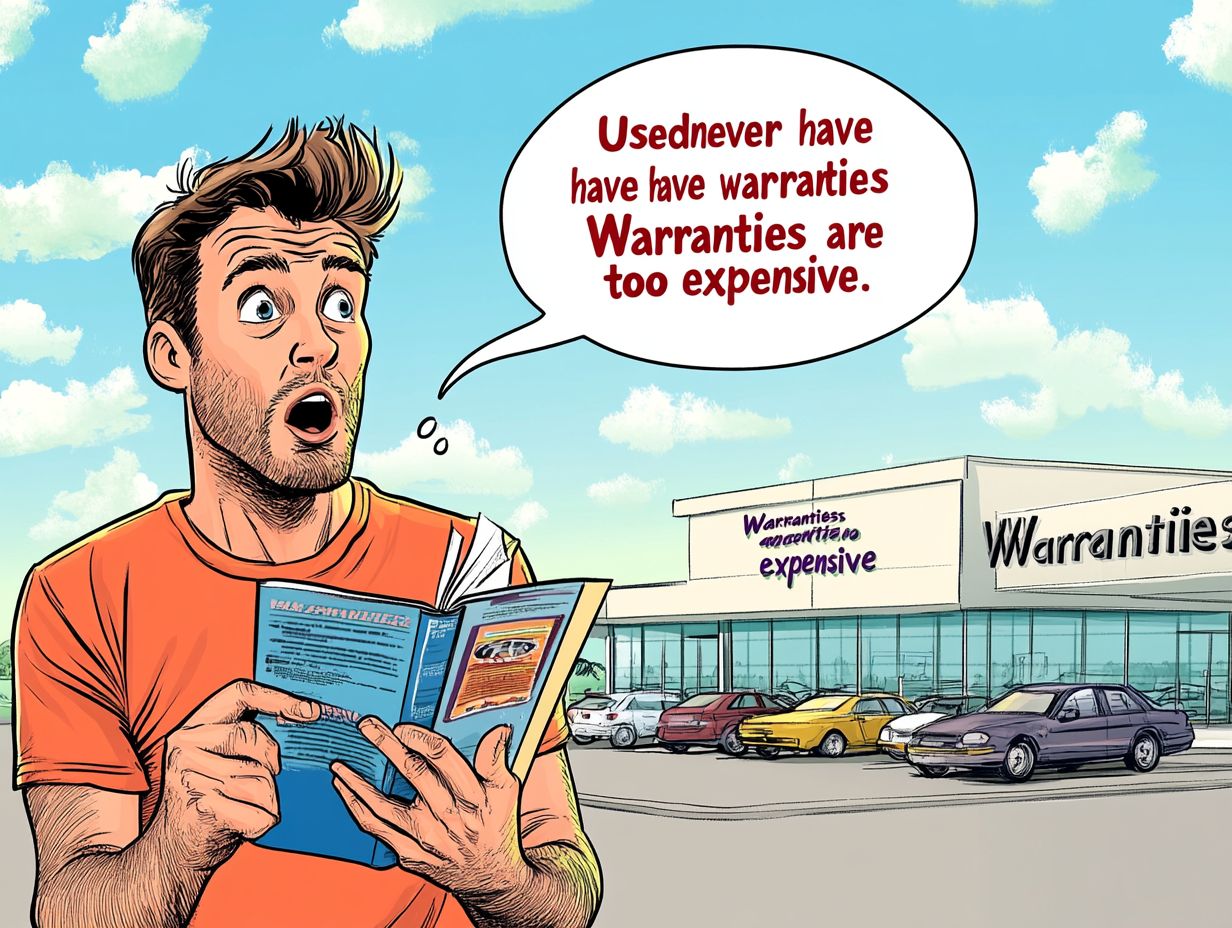
Purchasing a used car warranty offers numerous benefits, providing you with peace of mind and financial protection against unexpected repairs that can strain your budget. This coverage not only shields you from car problems but also simplifies the warranty claims process, allowing you to seek necessary repairs without financial stress.
Consider the experience of a satisfied customer who shared how their comprehensive warranty saved them over a thousand dollars during an unexpected transmission failure. This emotional relief underscores the financial advantages of having such a warranty, enabling you to enjoy your vehicle without worrying about unforeseen costs.
What Are the Common Exclusions in Used Car Warranties?
Common exclusions in used car warranties often hide in the fine print, leaving you unprepared for scenarios where your claims may go unhonored due to specific conditions. To better understand these exclusions, check out the top 10 questions about car warranties.
This lack of clarity can lead to unexpected repair costs that your warranty won t cover. Typical exclusions include routine maintenance items like oil changes, brake pads, and tire rotations items that are your responsibility. Many warranties also exclude damages from accidents or misuse, along with parts that naturally wear out over time.
You must thoroughly review the warranty’s terms and conditions before finalizing your decision. To enhance your protection, ask about potential coverage options for those common exclusions. Identify which items can be added for extra peace of mind.
How Can One Choose the Right Used Car Warranty?
Choosing the right used car warranty requires a thoughtful understanding of coverage options and assessing the current warranty status. You should evaluate the level of financial protection that aligns with your needs and budget.
Consider various factors that significantly influence your decision. Reflect on the type of vehicle you own; certain brands and models may have specific issues that affect repair costs.
Dive into the potential repair expenses related to your car s make and model, as high-maintenance vehicles often require more comprehensive warranties. Evaluate your financial situation to see if you can handle unexpected repair bills without a warranty.
This reflective approach protects your investment and grants you peace of mind as you cruise down the open road.
Act now! Take the time to evaluate your warranty options or consult a professional for tailored advice.
What Are the Alternatives to Purchasing a Used Car Warranty?
If you find that a used car warranty doesn t quite fit your needs, there are alternatives worth considering, such as traditional insurance, service contracts, or simply setting aside a budget for maintenance. Each option has benefits and drawbacks. Traditional insurance might cover specific damages, but it typically doesn t extend to problems that stop the car from working properly. Service contracts offer peace of mind but often come with limitations.
By establishing a dedicated budget for unexpected repairs, you can handle issues as they arise. Regular maintenance is key to this approach. It keeps your vehicle running smoothly and helps you spot potential problems before they become costly repairs.
Carefully weighing your options empowers you to make smart choices, enhancing your overall ownership experience.
Frequently Asked Questions
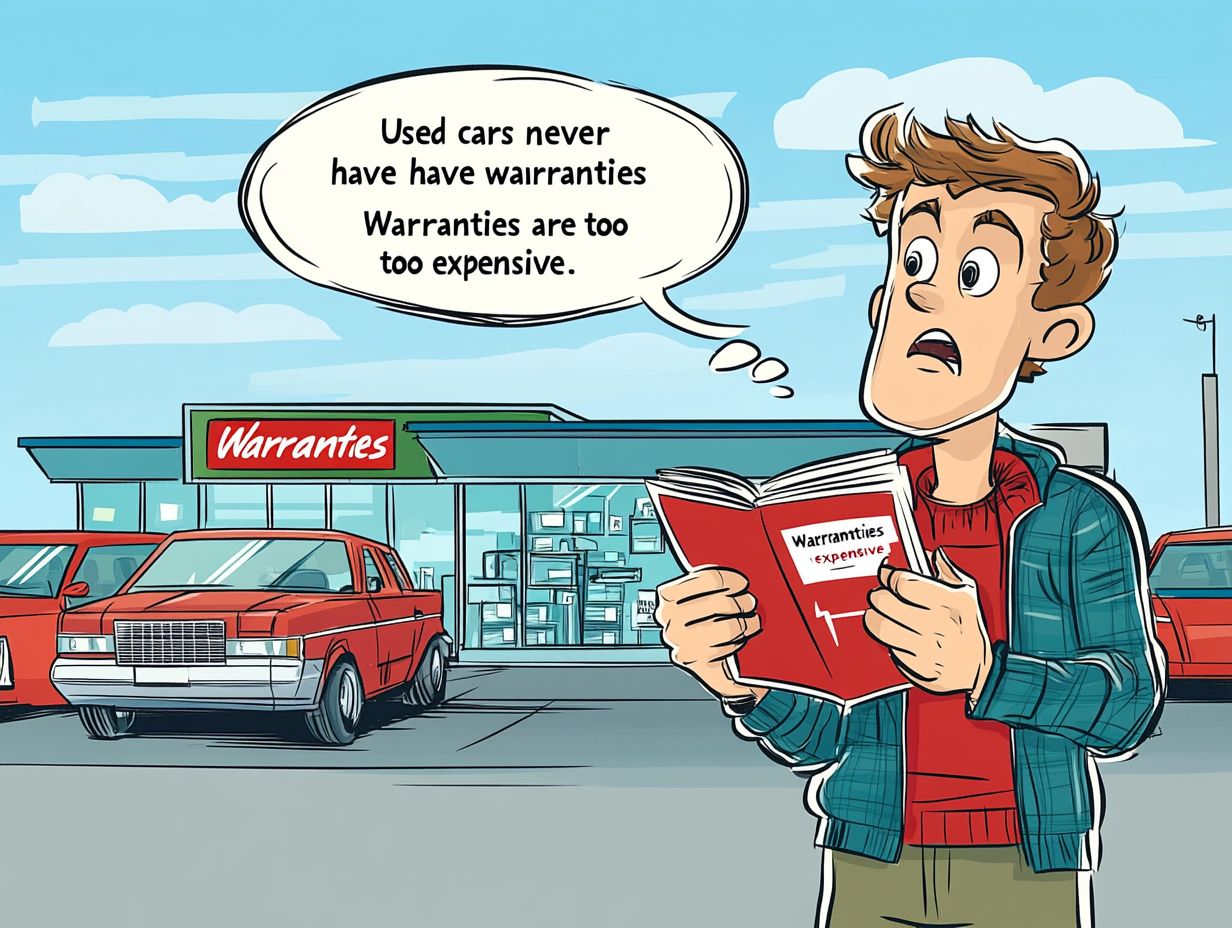
-
What are the most common myths about used car warranties?
-
Is it true that used car warranties are always a waste of money?
-
Are used car warranties only necessary for older or unreliable cars?
-
What is the difference between an extended warranty and a manufacturer warranty?
-
Do used car warranties cover all types of repairs?
-
Do I have to buy a warranty from the dealership where I purchased the car?
Some common myths include: Used car warranties are always a waste of money, only old or unreliable cars need warranties, extended warranties are the same as manufacturer warranties, used car warranties cover all repairs, and you can only purchase a warranty from the dealership where you bought the car.
No, this is not true. Used car warranties can provide valuable protection and peace of mind for buyers, especially for older or high-mileage vehicles. To better understand the misconceptions surrounding financing, check out the top 5 myths about car financing debunked. It all depends on the coverage, cost, and your individual needs.
Not necessarily. While older or higher-mileage cars may be more prone to breakdowns, even newer and more reliable cars can experience unexpected issues. A used car warranty can cover surprising repairs and save you money in the long run.
An extended warranty is purchased separately from the dealership or a third-party provider, while a manufacturer warranty is included with the purchase of a new car. Extended warranties often provide more coverage and flexibility, though costs and coverage lengths can vary.
No, it s essential to read the terms and conditions of a used car warranty before purchasing. Some warranties may have exclusions or limitations on certain repairs. Following the recommended maintenance schedule for your vehicle is also crucial for ensuring coverage.
No, you can buy a used car warranty from various providers, including dealerships, third-party companies, and even some credit card companies. It s wise to compare prices and coverage options to find the best warranty for your needs and budget.
Explore your options today and find the warranty that best protects your investment!




